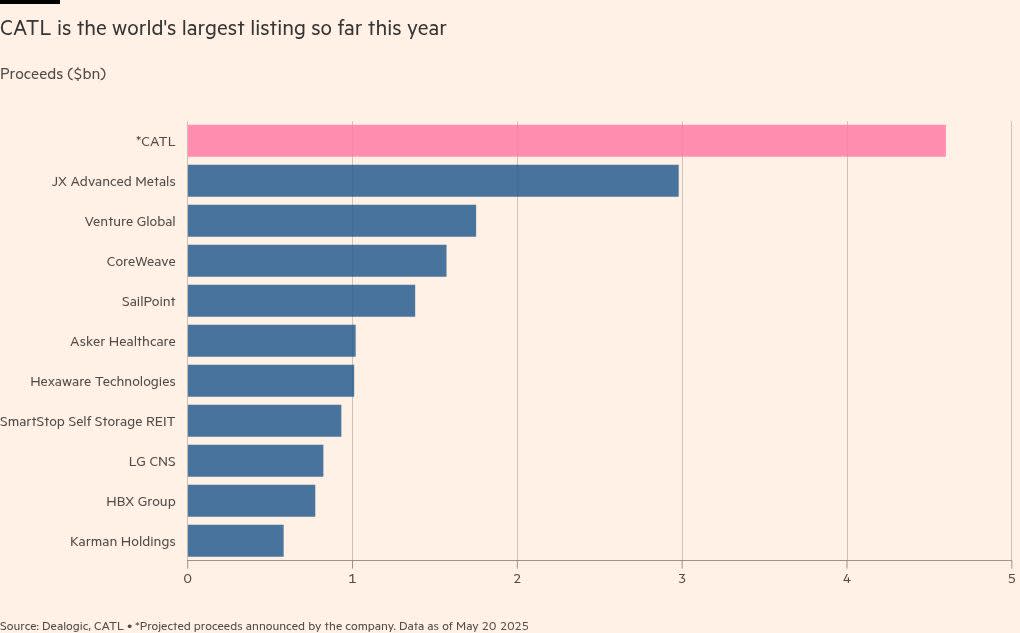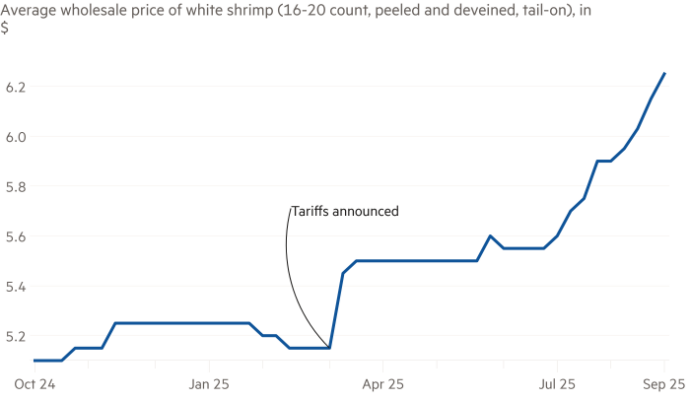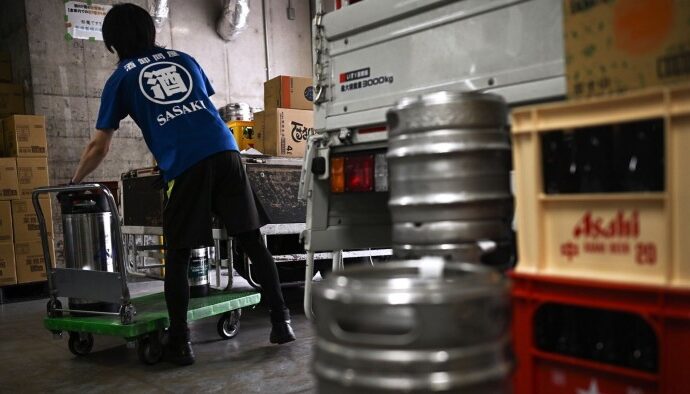Unlock the Editor’s Digest for free
Roula Khalaf, Editor of the FT, selects her favourite stories in this weekly newsletter.
CATL shares surged 16 per cent on their debut in Hong Kong on Tuesday as investors raced to back the Chinese battery maker in the biggest listing of a year dominated by Donald Trump’s trade war.
The company, which supplies Tesla and Volkswagen, raised $4.6bn as it tapped demand from Kuwait’s sovereign wealth fund, retail investors in Hong Kong and an investment vehicle backed by Italy’s billionaire Agnelli family.
Robin Zeng, CATL’s founder, took the company public on the Shenzhen Stock Exchange in 2018, but has added a Hong Kong listing as the billionaire presses ahead with an aggressive overseas expansion that includes a $7.3bn factory in Hungary.
Zeng said that CATL was not satisfied with being “just a battery component manufacturer”, as he banged a gong at the start of trading in Hong Kong and touted the group’s ambitions to be “the pioneer” in the zero-carbon economy.
The listing is a rare bright spot for global capital markets, which have struggled to build momentum this year in the face of the market turmoil unleashed by Trump’s sweeping tariffs.
Analysts said it was also an indication of global appetite for high-quality Chinese companies at a time when some investors were reviewing their exposure to US stocks.
Shares in CATL, which is the world’s biggest battery maker, closed up 16 per cent at HK$306 per share in Hong Kong, giving the group a market capitalisation of HK$1.3tn ($166bn).
Based in the Ningde in the south-eastern province of Fujian, CATL could ultimately raise $5.3bn if banks underwriting the sale, which include JPMorgan Chase and Bank of America, exercise an option to sell more shares.
Jason Lui, head of Asia-Pacific equity and derivative strategy at BNP Paribas, said the listing had benefited from international investors seeking exposure to the battery industry’s powerhouse as Trump’s trade war had dented the appeal of US assets.
“We are in this kind of unique scenario, where you have a well-known company issuing new shares, also at a time when you have a macro factor where investors want to diversify away from the US dollar-related assets,” said Lui.
Wang Shuguang, a management committee member at Chinese brokerage CICC, which advised on the sale, said CATL’s successful debut would encourage more leading Chinese companies to pursue listings in Hong Kong.
“The ‘A-share’ market provides robust liquidity and higher valuations,” Wang said, referring to stock that is traded on exchanges in mainland China, “while Hong Kong’s market enables flexible financing.”
“By leveraging both, companies can access diverse financing options and boost the financial agility of their global operations,” he added.
Chinese “A-shares” typically trade at a double-digit percentage premium to their “H-share” equivalents in Hong Kong, where initial public offerings are usually priced at a discount to entice buyers.
CATL controls about 37 per cent of the world’s EV and energy storage battery market, but it remains heavily reliant on the Chinese market, which accounted for about 70 per cent of its revenues last year.
Zeng has pursued the Hong Kong listing despite Trump’s trade war casting doubt over the company’s ambitions in the US.
In January, the battery maker was added to a Pentagon blacklist of companies believed to have ties to the Chinese military, although it has denied any such links.
A Republican lawmaker in April urged JPMorgan Chase and Bank of America to halt work on the listing.
Despite the Wall Street banks advising on the listing, many onshore American investors will not have access to the shares, given the listing was filed under a “Reg S” rather than “144A” regulation under US securities law.
This exempts CATL from some disclosure obligations and means US investors without offshore accounts are barred from investing.
One person familiar with the deal told the Financial Times that other US investors chose to wait to invest until after the listing in order to reduce scrutiny from Washington.
Chinese oil company Sinopec and Asian fund Hillhouse Investment were among the listing’s so-called cornerstone investors, who acquired stakes before the wider public could buy shares.
They were joined by Oaktree Capital Management as well as units of two Chinese state-owned groups, Postal Savings Bank of China and insurer Taikang Life. Cornerstone investors commit to own the shares for a certain period.



